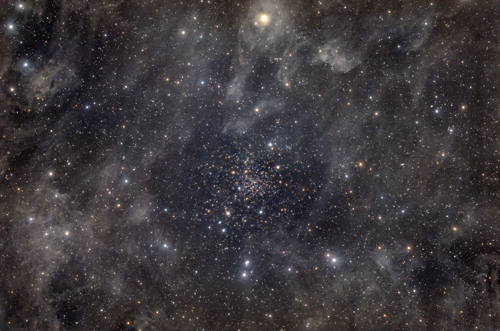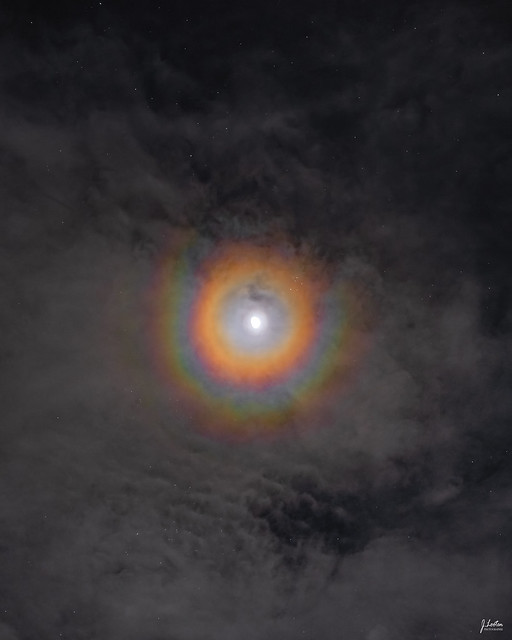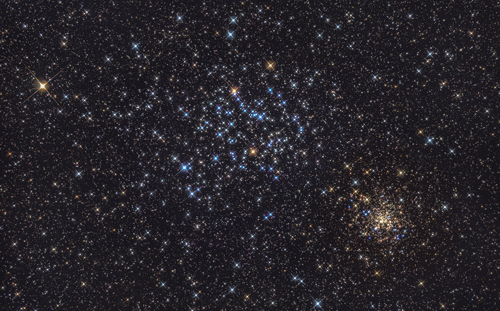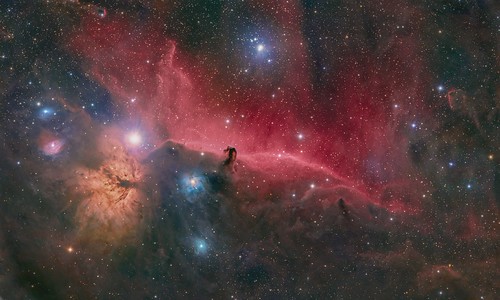Page 1 of 4
Submissions: 2024 February
Posted: Fri Feb 02, 2024 1:19 am
by bystander
__________________________________________________________________________________________________
Please post your images here.
Please see
this thread before posting images; posting images demonstrates your agreement with
the possible uses for your image.
If hotlinking to an image, please ensure it is under 500K.
Hotlinks to images over 500K slow down the thread too much and will be disabled.
Thank you!
_________________________________________________________________________________________________
<- Previous submissions
Re: Submissions: 2024 February
Posted: Fri Feb 02, 2024 5:36 am
by WolfHeart
The Great Orion & Running Man Nebulae - HaLRGB (SHO)
 The Great Orion & Running Man Nebulae - HaLRGB (SHO)
The Great Orion & Running Man Nebulae - HaLRGB (SHO) by
Ahmed Waddah, on Flickr
I had spent most of October, November and December imaging my favorite and the first region I had ever imaged 3 years ago which is the wide field region of the Orion and Running Man Nebulae captured in LRGB and HSO. Where Ha was added to the LRGB data to bring out the details in the region around the nebulae. Also, SHO combined data was used as luminance to bring out the details in the outer part of Orion and around the core.
William Optics Redcat 51
ZWO ASI2600MM Pro
ZWO AM5
Filters
Antlia 3nm Narrowband HSO filter Set
Antlia V-Pro LRGB Filter Set
Dates:
Oct. 15, 2023
Nov. 12 - 14, 2023
Nov. 16 - 17, 2023
Dec. 11, 2023
Dec. 13 - 14, 2023
Frames:
Antlia 3nm Narrowband H-alpha 2": 20×300″(1h 40′)
Antlia 3nm Narrowband Oxygen III 2": 29×300″(2h 25′)
Antlia 3nm Narrowband Sulfur II 2": 31×300″(2h 35′)
Antlia V-Pro Blue 2": 90×10″(15′)
Antlia V-Pro Blue 2": 120×30″(1h)
Antlia V-Pro Blue 2": 35×90″(52′ 30″)
Antlia V-Pro Green 2": 90×10″(15′)
Antlia V-Pro Green 2": 120×30″(1h)
Antlia V-Pro Green 2": 36×90″(54′)
Antlia V-Pro Luminance 2": 90×10″(15′)
Antlia V-Pro Luminance 2": 20×180″(1h)
Antlia V-Pro Luminance 2": 80×30″(40′)
Antlia V-Pro Luminance 2": 61×300″(5h 5′)
Antlia V-Pro Luminance 2": 30×5″(2′ 30″)
Antlia V-Pro Luminance 2": 35×90″(52′ 30″)
Antlia V-Pro Red 2": 90×10″(15′)
Antlia V-Pro Red 2": 120×30″(1h)
Antlia V-Pro Red 2": 35×90″(52′ 30″)
Total Integration:20h 59′
Software: Adobe Photoshop · Aries Productions Astro Pixel Processor (APP) · Pleiades Astrophoto PixInsight
Astrobin
https://www.astrobin.com/4k5vbf/
Social:
Facebook:
https://www.facebook.com/waddah.photography
Astrobin:
https://www.astrobin.com/users/WolfHeart/
IG:
https://www.instagram.com/waddahphotography/
Re: Submissions: 2024 February
Posted: Fri Feb 02, 2024 9:12 pm
by Groovynight
NGC 188 in Cepheus (close to Polaris)

(Thumb only)
>>>High Resolution:
https://astrophoto-hannover.de/download ... s_Horn.jpg
NGC 188 is a rarely photographed but highly interesting open star cluster: It is located not far from Polaris in the constellation Cepheus and hosts around 5,000 stars. At first glance, this may not seem particularly spectacular, yet it is truly extraordinary because NGC 188 is one of the oldest star clusters, with an age of 6.8 billion years. The fact that it still exists is a significant cosmic coincidence, as open star clusters typically dissolve over millions of years due to gravitational interactions with our Milky Way.
Furthermore, it is embedded in so-called "Galactic Cirrus" - thin molecular clouds that surround it and are faintly illuminated by the light of our Milky Way. To enhance the visibility of this cirrus, I have been able to add approximately five additional hours of exposure time to my 2022 capture.
Celestron RASA 8
Celestron Motorfocuser
EQ6-R Pro
ZWO ASI 2600 MC Pro (Gain 100, Offset 18, -10°)
RGB: 200 x 120 secs (6h 40') & 305 × 6 secs (5h 5′)
Total: 11h 45′
N.I.N.A., Guiding: ZWO ASI 120MM and PHD2
Astropixelprocessor, Photoshop, Pixinsight
Date: January 10, 2024 & March 27, 2022
Location: Hannover, Germany (Bortle 5-6)
Contact:
Website:
www.astrophoto-hannover.de
Instagram: @astrophoto_hannover
Astrobin:
https://www.astrobin.com/users/Groovynight/
E-Mail:
info@astrophoto-hannover.de
Re: Submissions: 2024 February
Posted: Sat Feb 03, 2024 2:39 pm
by Antekza
Image below was taken during the first full moon of the year "wolf moon". It represents very interesting glare around the moon called "Lisia Czapa" (Fox hat) in Polish. It is rarely seen to scatter around high clouds like this thus making for a very interesting and rare shot.

Image was taken in HDR technique so i made two exposures at diffrent exposure times to get glare and moon surface details. Used equipment:
Canon 70D
Samyang 135mm F2.0
Both on tripod
Location: Italian Alps (Near Pragelato)
Re: Submissions: 2024 February
Posted: Sat Feb 03, 2024 7:50 pm
by pineta1984
The core of Iris Nebula - NGC 7023.
An iris in the sky formed 1400 years ago. It is part of the constellation Cepheus and is visible throughout the northern (northern) hemisphere, reaching its maximum height between the months of August and November. The photo was taken between October and November 2023 and is the sum of 54.15 hours of photography through our remote observatory in Spain. The blue and red shades surrounded by the dark dust are always fascinating me and the Iris is, by far, my preferred target ever.

 NGC 7023
NGC 7023 by
Astro Divers, su Flickr
Re: Submissions: 2024 February
Posted: Sat Feb 03, 2024 8:34 pm
by Julien Looten
Lunar Crown and Pleiades
Copyright: Julien Looten
The photograph, taken on the evening of January 20th from the city of Arras, after a significant snowfall in northern France, reveals a remarkable celestial phenomenon - a lunar crown. Are you familiar with this rare phenomenon?
Unlike a typical rainbow, the observed phenomenon was not related to recent rain but rather to the refraction of light in the droplets or ice crystals present in the air, particularly in the clouds. A luminous and whitish halo formed directly around the moon. At the periphery of this lunar crown, the characteristic colors of a rainbow emerged, although their separation was not as distinct as that of a traditional rainbow. The hues appear to blend harmoniously into one another.
This phenomenon is characterized by its relatively small diameter. The inner edge surrounding the moon extends at an angle between 2.5° and 8°, while the outer edge can reach up to 15°.
Another feature of this image is the "conjunction" between the moon and the Pleiades (a cluster of stars) present in the orange halo within the crown.
Equipment used: Canon 6D astrodon – January 20, 2024 – Canon 50mm - HDR.


Instagram : j.looten
Facebook :
https://www.facebook.com/Julien.Looten.Photographie
Re: Submissions: 2024 February
Posted: Sun Feb 04, 2024 8:09 am
by Guest
99% Mineral Moon
Copyright: Emanuele Chiapparelli
A mineral moon image reveals the moon's surface with amplified colors, facilitating the differentiation of various terrain compositions. Enhanced hues such as blue, cyan, purple, and brown signify the presence of titanium and iron elements. This portrayal dispels the notion of the moon as a dull grey sphere in the sky.
Re: Submissions: 2024 February
Posted: Sun Feb 04, 2024 12:08 pm
by Groovynight
M 35 and NGC 2158 in Gemini

(Thumb only)
>>>High Resolution:
https://astrophoto-hannover.de/download ... s_Horn.jpg
Messier 35 and NGC 2158 are open cluster in the constellation of Gemini. The two clusters are unrelated and 9,000 light years far away from each other.
NGC 2158 is believed to be about 2 billion years old, and its stars are strongly concentrated, similar to a globular cluster. Previously, it was mistaken for such due to its concentration; however, due to its age, the identification as an open star cluster is unequivocal.
When NGC 2158 is observed alongside M35 in the telescope's field of view, the contrast in size and star density becomes particularly evident. NGC 2158 is five times farther away but has at least 10 times more stars and a much higher age.
Skywatcher Explorer 200P f/5 at 950mm
EQ6-R Pro
TS Coma Corrector
ZWO EAF
ZWO ASI 2600 MC Pro (Gain 100, Offset 18, -10°)
RGB: 362 × 30″ (3h 1′)
N.I.N.A., Guiding: ZWO ASI 120MM and PHD2
Astropixelprocessor, Photoshop, Pixinsight
Date: January 28, 2024
Location: Hannover, Germany (Bortle 5-6)
Contact:
Website:
www.astrophoto-hannover.de
Instagram: @astrophoto_hannover
Astrobin:
https://www.astrobin.com/users/Groovynight/
E-Mail:
info@astrophoto-hannover.de
Re: Submissions: 2024 February
Posted: Sun Feb 04, 2024 12:38 pm
by alxtrnk
LBN746 and friends!
Could you find the five asteroids present in this image??
Actually, there were much more than five asteroids in this region of the sky the day I captured the data (19/11/2023), but only five appeared after stacking images. I looked for information with the help of Aladin software and these are the asteroids captured:
- 2000 UG104
- 2001 OQ105
- 2022 VS134
- 2015 GX76
- 2023 TE140
I didn't want to remove asteroid traces as they are also part of the sky, and rarely imaged objects.
I have discovered nothing new, but I am happy with final image result.
Re: Submissions: 2024 February
Posted: Sun Feb 04, 2024 11:59 pm
by Alson Wong
M78
Copyright: Alson Wong
Re: Submissions: 2024 February
Posted: Mon Feb 05, 2024 11:58 am
by Adrian_Criss
Re: Submissions: 2024 February
Posted: Tue Feb 06, 2024 2:05 pm
by Jeremy_kr
Fly Me to the Moon
Copyright: Jeremy Rigney
https://homepages.dias.ie/jrigney/asset ... ressed.jpg
Hi all, this is my first post to the forum so I hope it is formatted correctly!
The image was taken late afternoon on January 18th, it is a single frame capturing Ryanair flight FR2970 (Tenerife to Edinburgh) passing over Dublin, and in front of the moon. I caught it by chance as I was already imaging the moon at DIAS Dunsink Observatory (
https://www.dunsink.dias.ie/) during cold weather with good seeing.
Equipment:
Celestron Edge HD8
NexStar Evolution mount
Canon EOS M50
Link to a higher resolution version:
https://homepages.dias.ie/jrigney/asset ... signed.jpg
Website:
https://www.dias.ie/jeremy
Twitter/X: @jeremyrigney
Re: Submissions: 2024 February
Posted: Tue Feb 06, 2024 5:47 pm
by The Mask 138
https://ibb.co/PFN4gnR
Good morning
This is my first post
I'm Goffredo from Italy, my photograph is entitled:
Trigonometry ( Tan 45⁰ of the Moon)
Re: Submissions: 2024 February
Posted: Tue Feb 06, 2024 8:28 pm
by Roi Levi
"Celestial Symphony: Aurora Display at Havitsuker"
Description:
Date: September 12th, 2023
copyrights - Roi.L
Location - Iceland
Witness the awe-inspiring dance of the Northern Lights captured in this breathtaking 16-panel panorama. Shot with a Sony a7R3a camera paired with a wide Sigma 14mm lens, the scene unfolds at Havitsuker, where nature painted the night sky with vibrant hues following a solar storm.
The image showcases the majestic Rhino Rock dominating the foreground, while the Big Dipper constellation graces the left side of the frame, guiding the viewer's gaze towards the celestial spectacle. Each panel of the panorama captures the intricate movements of the auroras as they sway and shimmer in the darkness, casting a mesmerizing glow upon the serene waters below.
This moment, shared during a "Capture the Cosmos" photo tour expedition, at deep space workshops encapsulates the harmony between Earth and sky, inviting viewers to marvel at the wonders of the universe.
Re: Submissions: 2024 February
Posted: Wed Feb 07, 2024 9:53 am
by AstroPaolo
 IC1805 Heart Nebula
IC1805 Heart Nebula by
Paolo, on Flickr
In the centre of the beautiful heart nebula are several open star clusters, including the one I decided to capture, Melotte 15.
An area rich in star formations and nebulae, it looks like a painting with its colours and shapes.
For this subject I inaugurated the new narrow-band Antlia filter and collected 10 hours of data during the last few evenings of the moon.
Due to clouds and some calibration problems I eventually managed to use only 7 hours, but enough to achieve good details.
RC10 on AZEQ6 mount
Ares 533C with Antlia Ha-O3 filter
Nina, Pixinsight and Photoshop for the software
Re: Submissions: 2024 February
Posted: Wed Feb 07, 2024 11:14 pm
by isultan

Heart and Soul Nebulae
This is a widefield view of the Heart and Soul Nebulae in the constellation Cassiopeia. Captured from Bortle Class 8-9 city skies over three nights in dual narrowband (H-alpha and O III).
164x300 sec
Equipment:
ZWO ASI533MC Pro
Samyang 135mm f/2
Optolong L-Ultimate 2" filter
Star Adventurer GTi, ZWO 30mm f/4 guidescope, ASI120MM Mini guidecamera, ASIAIR Pro
Processing:
Astro Pixel Processor, PixInsight (incl. BlurXTerminator, NoiseXTerminator, Bill Blanshan Narrowband Normalization scripts), StarNet v2, Adobe Photoshop
Location: Des Plaines, Illinois
Dates: 9/30-10/2 2023
Copyright: Imran Sultan
Re: Submissions: 2024 February
Posted: Thu Feb 08, 2024 10:34 am
by zombi
Region around the left eye of the Taurus
 Region around the left eye of the Taurus
Region around the left eye of the Taurus by
.zombi., on Flickr
Imaging telescopes: Takahashi FSQ-106EDXIII
Imaging cameras: Moravian G3-16200EC
Accessories: Reducer-QE 0.73X
Mounts: Sky-Watcher NEQ6-Pro
Software: N.I.N.A. · PixInsight · Adobe Photoshop
Frames:
Baader Blue (B-CCD) 50 mm: 11×180″(33′)
Baader Green (G-CCD) 50 mm: 11×120″(22′)
Baader Red (R-CCD) 50 mm: 11×120″(22′)
Baader UV/IR Cut / Luminance 50 mm: 32×600″(5h 20′)
Photographic technique: LRGB
Integration: 6h 37′
Bortle Dark-Sky Scale: 3/4
Location: Borchów
Dates: September 16-17, 2023
Description:
Picture taken in September 2023 during starparty.
Image Credit & Copyright: Przemysław Ząbczyk
Links:
http://www.astrobin.com/users/zombi/
https://www.astropolis.pl/tags/zombi/
LBN: LBN 817, LBN 819, LBN 821
LDN: LDN 1543, LDN 1546, LDN 1551,
VdB: VdB28
NGC-IC: NGC1554, NGC1555
Sharpless: Sh2-238, Sh2-239
Asteroids: 358 Apollonia, 65 Cybele
Re: Submissions: 2024 February
Posted: Thu Feb 08, 2024 7:04 pm
by javierflores

Hi, I want to share this image of Calar Alto Observatory. I know it is not the perfect background because I badly integrated the planes to the image when I was processing it. Maybe in the future I will reprocess this image but for now here is M51 and the small IC4278.
Re: Submissions: 2024 February
Posted: Fri Feb 09, 2024 10:09 am
by Davide75
IC 447 in Monoceros
 IC447_scaled
IC447_scaled by
davide nardulli, su Flickr
IC 447 is a reflection nebula, which glows blue as starlight reflects off its gas and dust. Also known as the Dreyer Nebula (in honor of whoever cataloged it), it is thought to be part of the same cloud of gas and dust that encloses the Cone and Foxfur Nebulae. IC 447 is in good company, above is IC 446 while to its left are the small NGC 2247 and 2245, other fascinating reflection nebulae nests of young and very hot stars.
I photographed this splendid cosmic field on Saturday 3 February in the company of friends from G.A.S. SALENTO Amateur Astronomers Group at the Palazzo S. Spirito in Stigliano (MT), the acquisition was carried out with broadband filters, L for the luminance and in bin2 the RGB color channels respectively, finally the narrow band signal HA (hydrogen) from my home observatory Monday 5th. for a composition in LRGB + HA.
Technical data and tools
light : L : 110x180s bin1 , RGB : 40x180s. bin2 , HA : 80x180s. bin1
data acquisition: Asi Air Plus
telescope: Skywatcher 80ED with 0.85x reducer/flattener
main chamber: Asi 2600 MM pro
guide: Oag-L + Asi 290 MM mini
filter wheel: Efw 7x2
focuser: Eaf 5v
mount: Skywatcher EQ6R-pro
processing: Dss, PixInsight and Photoshop
Bortle 4, sqm 21.40 Stigliano (MT) Italy
Bortle 6, sqm 19.30 my observatory
https://www.flickr.com/photos/196894264@N07/
https://www.instagram.com/nardullidavide/
https://www.facebook.com/profile.php?id=100006635328496
Copyright : Davide Nardulli
Re: Submissions: 2024 February
Posted: Fri Feb 09, 2024 3:26 pm
by javierflores

Hi, I want to share this image of Calar Alto Observatory. This is the Hubble variable nebula NGC 2261 in the constellation of Monoceros.
Re: Submissions: 2024 February
Posted: Fri Feb 09, 2024 3:33 pm
by javierflores

Hi, I want to share this image of Calar Alto Observatory. This is the Arp273 a pair of interacting galaxies in constellation of Andromeda.
Re: Submissions: 2024 February
Posted: Fri Feb 09, 2024 3:42 pm
by andrea_girones
An Overlooked Jewel of the SKy
Have you ever felt small or ignored in the shadow of a bright superstar? Meet NGC 1977 located in the Orion’s Belt, close to its more famous neighbour, the gloriously bright and dynamic Great Orion Nebula. In fact, NGC 1977 was my third choice on the evening of Feb.5th, 2024, after giving up on other fancier targets that were too low( Thor’s helmet), or behind a tree (the seagull).
Well there was much more intrigue and beauty to this part of space than I could have possibly imagined! These are naturals colours with natural molecular cloud dust , no crazy narrowband filters, and no heavy processing.
Just a cotton candy coloured, natural Jewel in the Sky.
Imaged at 1960mm focal length with red green and blue filters.
Celestron C11 with a 0.7x reducer and the ASI2600MM
6 hours, 2 in each colour, processed in Pixinsight.
 An Overlooked Jewel of the Sky
An Overlooked Jewel of the Sky by
Andrea Girones, on Flickr
Re: Submissions: 2024 February
Posted: Fri Feb 09, 2024 8:09 pm
by Jose Ordoñez
The photo was taken on September 5, 2023 at 9:45 a.m. in the city of Popayán, Cauca, Colombia. I was riding my bike, I looked at the sky and saw a colorful cloud around the sun, a thick cloud covered the sun, so I could see its shape next to the iridescent cloud.
 Iridescent Cloud Over Colombia
Iridescent Cloud Over Colombia by
José Fernando Ordóñez, en Flickr
-Exift:
Canon 90D, f/20, 1/5000, ISO 100, EF 70-200mm (70mm)
-Processing: Lightroom
-Social:
https://www.instagram.com/josefordonez/
https://www.facebook.com/joseordonezfotografia
José Ordoñez
Photographer
Environmental engineer
Universidad del Cauca
Re: Submissions: 2024 February
Posted: Sat Feb 10, 2024 10:31 am
by AstraPharmaQ8
Orion: Complex, versatile and unapologetically beautiful by Ali Alobaidly

Description:
What I love the most about Orion and his neighbors, the horse and flame, is that they are both emission and reflection nebulae. The region is so rich in data that any astrophotographer can produce a beautiful portrait of Orion's lights wherever they may be, in light polluted skies using narrowband techniques or somewhere dark using broadband imaging. What if, however, you did both. Can you make use of the rich Hydrogen alpha (Ha) data and still maintain a hint of the nebula's broadband colours? Could you blend both sets of data and reveal the running man, famously absent in the Ha emissions? What about M72's beautiful blue reflections and dark tendrils? This region is captivating in its diversity, it seems an injustice not to try to isolate some of its landmarks in the full spectrum or surrender others when you narrow down the light hitting your camera sensor. This image, shot in both dual-Band (Ha & Oiii) and broadband, is my uncompromising attempt at revealing Orion the way I believe it yearns to be observed. Complex, versatile and unapologetically beautiful.
Acquisition details:
Dates: February 7th, 2024 & February 8th, 2024
Frames:
OSC RGB: 30×60″(30′)
Optolong L-Ultimate 2" (Dual-Band Ha & Oiii 3nm): 81×300″(6h 245′)
Total Integration: 7h 15’
Avg. Moon age: 27.28 days
Avg. Moon phase: 5.91%
Equipment
Imaging Lenses: Rokinon 135mm f/2.0 ED UMC (Stopped at F/2.8)
Camera: ZWO ASI2600MC Pro
Mount: ZWO AM5
Filter: Optolong L-Ultimate 2"
Accessories: ZWO ASIAIR Plus · ZWO EAF
Re: Submissions: 2024 February
Posted: Sat Feb 10, 2024 7:14 pm
by wrightdobbs
Moon and Venus rise into the morning sky as the Milky Way climbs higher above them on the morning of February 7th, 2024. Captured from a beach along the Forgotten Coast in Florida near Panacea, Florida.
EXIF: Tamron 28-75 f/2.8 lens @ 28mm f/3.5, ISO2000, 20s. 3 image vertical panorama in horizontal orientation.
Copyright/Credit: Wright Dobbs (@wrightdobbs)
https://twitter.com/WrightDobbs
https://www.facebook.com/wrightdobbsphotography
https://instagram.com/wrightdobbs
https://wrightdobbs.darkroom.com


















